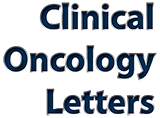Resposta patológica completa ao tratamento neoadjuvante como fator prognóstico para pacientes com câncer de reto
Pathologic complete response to neoadjuvant treatment as a prognostic factor for patients with rectal cancer
Fernanda Borges Silva Ferreira, Claudia Vaz de Melo Sette, Damila Cristina Trufelli, Felipe José, Silva Melo Cruz, Auro del Giglio
Resumo
Objetivo: Analisar a presença de resposta patológica completa (RPC) como fator prognóstico para sobrevida global (SG) e sobrevida livre de progressão (SLP) e avaliar se há algum fator preditivo para RCP após realização de tratamento neoadjuvante em pacientes com câncer de reto localmente avançado. Métodos: Estudo retrospectivo de pacientes admitidos no hospital Mário Covas no período de 01/01/2009 a 01/04/2014, com diagnóstico de câncer de reto localmente avançado. Foram coletados dados demográficos, clínicos e patológicos dos prontuários dos pacientes incluídos. As informações obtidas foram submetidas à análise estatística. Resultados: Foram incluídos 91 pacientes. Verificou-se melhor prognóstico, com aumento de SLP em pacientes com RCP após neoadjuvância, e linfonodos negativos no estadiamento patológico. Não houve associação entre essas características e aumento de SG. Nenhuma variável mostrou ser fator preditivo de RPC. Conclusão: A casuística apresentada demonstrou que RCP pós-tratamento neoadjuvante para câncer de reto localmente avançado é fator prognóstico em relação a SLP.
Palavras-chave
Abstract
Objective: The role of pathological complete response (Pcr) as a prognostic factor for overall survival (OS) and progression-free survival (PFS) and evaluate if there is any predictor of pathologic complete response after neoadjuvant treatment completion in patients with locally advanced rectal cancer. Methods: Retrospective study of patients admitted in the hospital Mario Covas from 01/01/2009 to 04/01/2014, diagnosed with locally advanced rectal cancer. We collected demographic, clinical and pathological data of medical records of patients included. The information obtained was submitted to statistical analysis. Results: During the study period 91 patientswas included and PCR after neoadjuvant therapy and negative lymph nodes during the pathological staging was associated with better PFS. There was no association between these characteristics and increased in OS. No variable was found to be predictive of PCR. Conclusion: The series presented demonstrated that complete post-neoadjuvant pathological response for locally advanced rectal cancer is a prognostic factor for progression-free survival (PFS).
Keywords
Referências
1. Estimativa 2014: incidência de câncer no Brasil / Instituto Nacional de Câncer. Rio de Janeiro: INCA; 2014.
2. Heald RJ, Ryall RD. Recurrence and survival after total mesorectal excision for rectal cancer. The Lancet. 1986; 1(8496):1479–1482.
3. Sebag-Montefiore D, Stephens RJ, Steele R, et al. Preoperative radiotherapy versus selective postoperative chemoradiotherapy in patients with rectal cancer (MRC CR07 and NCIC-CTG C016): a multicentre, randomised trial. The Lancet. 2009; 373(9666): 811–820.
4. [No authors listed]. Prolongation of the disease-free interval in surgically treated rectal carcinoma. Gastrointestinal Tumor Study Group. N Engl J Med. 1985; 312:1465–1472.
5. Fisher B, Wolmark N, Rockette H, et al. Postoperative adjuvant chemotherapy or radiation therapy for rectal cancer: results from NSABP protocol R-01. J Natl Cancer Inst. 1988; 80:21–29.
6. NIH consensus conference. Adjuvant therapy for patients with colon and rectal cancer. JAMA. 1990; 264:1444–1450.
7. Caplin S, Cerottini JP, Bosman FT, Constanda MT, Givel JC. For patients with Dukes’ B (TNM stage II) colorectal carcinoma, examination of 6 or fewer lymph nodes is related to poor prognosis. Cancer. 1998; 83:666–672.
8. Cianchi F, Palomba A, Boddi V, et al. Lymph node recovery from colorectal tumor specimens: recommendation for a minimum number of lymph nodes to be examined. World J Surg. 2002; 26:384–389.
9. Sarli L, Bader G, Iusco D, et al. Number of lymph nodes examined and prognosis of TNM stage II colorectal cancer. Eur J Cancer. 2005; 41:272–279.
10. Rödel C, Liersch T, Becker H, et al. Preoperative chemoradiotherapy and postoperative chemotherapy with fluorouracil and oxaliplatin versus fluorouracil alone in locally advanced rectal cancer: initial results of the German CAO/ARO/AIO-04 randomised phase 3 trial. Lancet Oncol. 2012 Jul;13(7):679-87.
11. André T, Boni C, Navarro M, et al. Improved overall survival with oxaliplatin, fluorouracil, and leucovorin as adjuvant treatment in stage II or III colon cancer in the MOSAIC trial. J Clin Oncol. 2009; 27:3109–3116.
12. Aschele C, Cionini L, Lonardi S, et al. Primary tumor response to preoperative chemoradiation with or without oxaliplatin in locally advanced rectal cancer: pathologic results of the STAR-01 randomized phase III trial. J Clin Oncol. 2011; 29:2773–2780.
13. Glynne-Jones R, Kronfli M (2011) Locally advanced rectal cancer: a comparison of management strategies. Drugs 71: 1153–1177.
14. Palma P, Conde-Muíño R, Rodríguez-Fernández A, et al. (2010) The value of metabolic imaging to predict tumour response after chemoradiation in locally advanced rectal cancer. Radiat Oncol 5: 119.

